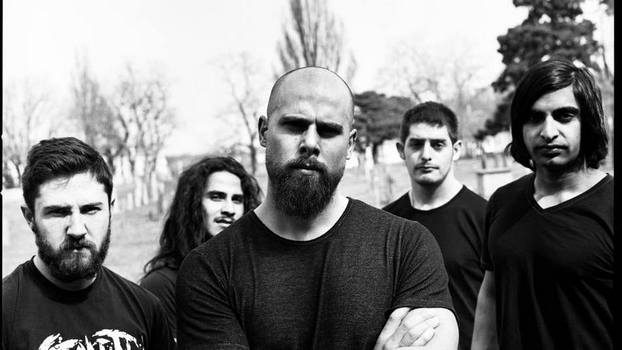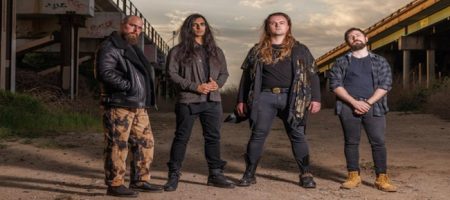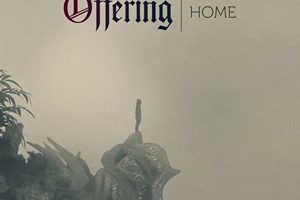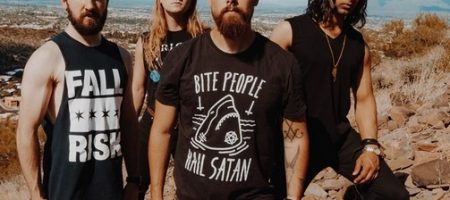The Offering – Climbing the Ladder
Wednesday, 20th December 2017
With so many bands in the metal landscape, it’s rare to find one that surprises and impresses out of nowhere. Massachusetts-based The Offering buck the odds though, and are bound to elicit a response of enthusiasm and excitement after listening to their self-titled EP. There’s a unique and fresh feeling to their music – one that transcends subgenre boundaries. It pays homage to some of the older gods, yet maintains a modern sensibility. One that those into melody in both extreme and traditional genres will find invigorating.
They initially released their debut EP independently at the start of 2017. But it hasn’t taken long for the higher-ups to notice the up-and-coming band. They signed a contract with Century Media later in the year, who have now re-released the EP on a much larger scale. While the band was driving to their NYC gig of a mini-tour in support of the release, we chatted with drummer Steve Finn, guitarist Nishad George, and vocalist Alex Richichi about the band’s rise through the ranks, move from Florida to the Northeast, the makings of their EP, as well as the future ahead of them.
Dead Rhetoric: How do you describe The Offering to someone who has not heard you, with all of the different sounds you have going on?
Steve Finn: I think, actually it’s funny – Dan, Yoav, and I were talking about it. Dan had a really good way of describing it – melodic death metal but with old school roots. That’s sort of what I would say. Power metal but it has a core kind of thing happening at the same time, but with a high tenor singer.
Dead Rhetoric: The EP was very professionally done – did you go ‘all in’ to make sure the first impression was a good one?
Nishad George: We kind of thought that from the get-go. We knew whatever we did first would be what stuck. We were pretty aware that what we were doing wasn’t something that had been done before. I don’t want to sound cocky, but I hadn’t really heard it before. We knew that whatever we did, it needed to be as world-class as we could possibly make it, as a starting band. We wanted to make that first impression count.
Steve Finn: I think another side of it too is that we had a whole other set of things happening. We had made the decision to write the record for ourselves. We wanted to make a record and make it really good. I don’t think it was necessarily a decision to be professional so other people would like it, so much as a reflection of us putting everything we could into it and making the best record we possibly could. Really climbing the stairs to the path to success – the best way to do that was to make a really good record. To get a really good studio, and have all the right people on the time – that was the mentality behind that.
Dead Rhetoric: So was the EP designed as a way to get you out there so that maybe you could end up signing with a label?
Nishad George: Absolutely. We can’t get into the specifics of it exactly, but we had something else planned out like that, but it fell through. Even though at that point, that opportunity fell from underneath us, we all sat together and said, “Do we still want to do this?” Everyone agreed that they did – at that point we saw what we had put into it and what was coming out of it.
Steve Finn: Ultimately, it ended up being a much better thing in the end. If things had panned out the way they were supposed to, we would be much worse off. I think the goal, even at that point, we just wanted to take the stairs – put in the work, put in the time. I think with any band, it starts with the music.
Dead Rhetoric: Could you talk about the help and endorsement from Kelly Schaefer (Athiest) and Gen Vincent (Genitorturers)?
Nishad George: We were in Florida for a huge chunk of time, and that’s when we met both of them. The first time we played in Sarasota, we didn’t even realize that it was Kelly Schaefer’s venue. So we had no idea he was in there and watching us. From the moment he heard us, he was telling us he would do everything he could to help us out. He pulled through. If it wasn’t for him, we wouldn’t have a deal with Century Media. He’s the one who threw all these contacts towards us. He believed in us from the very beginning. A really good guy – he’s friends with Alex. He really supports us even to this day.
With Gen, we had played a show a while after we had met Kelly. So we went to the after-party, and we had no idea that Gen and her husband owned that bar. They took Primal Fear out, and their guitar tech was very friendly with us so we were invited to go to The Castle, which is one of Gen’s pretty crazy clubs. We hung out with her, and afterwards, she asked me to fill in on guitar for a Genitorturers gig. From that point, it became a “if you ever want to play with us, we’d love to have that happen” and they went on tour. They asked us to go on the road with them. That was a really good opportunity for us.
Steve Finn: Alex and I actually roadied for that show. There were some good ties there. From being in the same scene, we sort of merged together.
Nishad George: Everyone in that entire group, with Kelly or Gen, went above and beyond…they still do to this day. We are really lucky.
Dead Rhetoric: So you were down in Florida. What prompted the move to New England at the start of the year?
Steve Finn: I think part of it was that our management was in Boston, so part of the move was to be closer there. Some of us had family and relatives/girlfriends/business in that vicinity. We did meet at Berklee, so a lot of our ties are from the northeast anyway. There was a lot of gravity pulling us back. I think we did what we needed to do in Florida. We loved the guys down in Florida, but we were very alien to that scene going in. We came in and we did what we needed to do. We were done with that chapter and needed to move on.
Nishad George: We went to Tampa and we met some really important people, but for the sake of moving forward it was the best choice for us.
Dead Rhetoric: Do you think that moving back up to New England helped to propel the band at all?
Nishad George: I think it was really necessary. I’ve only seen good things happen from that point onwards. What was really important was that everyone was comfortable making that decision. At the end of the day, everyone has to be happy and everyone has to be on-board with something like this. I think it was a good choice.
Steve Finn: I think the most important part of us moving back was that in Florida, we did a lot of playing but sometimes I feel like a lot of bands can play forever and never really get their business stuff sorted out. It was very important for us to figure that out. We made the move consciously and then figured out our business stuff. Ultimately I think it panned out.
Dead Rhetoric: There’s a lot of younger bands that don’t consider that business aspect of it. They get stuck; they are trying as hard as they can musically but it’s just not working out because they ignore that.
Steve Finn: I think it’s extremely important. I was listening to a podcast last night on the way home – it’s so important to have that part figured out. Obviously the music is central, but how are you going to make a living if no one knows who you are? If you can’t pay the rent, how long can you keep it up? It’s more of a short term thing if you don’t have that figured out I guess.
Dead Rhetoric: How did the deal come about with Century Media?
Nishad George: Like I said earlier, Kelly gave us this contact. It wasn’t our current A&R, but Alex was talking to Jens [Prueter], who I believe is the president of A&R at Century Media Records. They spoke back in October or November in 2016. Between that point, and the next time we got in contact with them, which I want to say was about March 2017, we had a new manager and a deal with APA. So when Alex talked with them again, we had a lot more growth. That really was encouraging for them. We gave them demos for the next record, and they saw a lot of progression going on. Having all of these connections put together, they were ready for us. Back in November, they said they really liked us but didn’t come to a decision at that point. I think they are treating us really well, and there’s a lot of confidence.
Steve Finn: Between the tour with Gen and getting the management, and just getting our name out there, I think enough people were barking at the Century Media people that they paid attention. I’m assuming, but I remember everyone was hitting people up about doing something for The Offering.
Dead Rhetoric: Were you surprised that one of the bigger metal labels was interested so early on?
Nishad George: We take everything like that with a crazy amount of gratitude. We’ve only been a band for maybe a couple of years at this point. We’ve talked to other guys, and we are lucky in that Century Media come from that good connection with Kelly, and they genuinely like what we are doing. They give us a lot of wiggle room with how we want to go forward, creatively. When you go through a lot of those processes and they fall through, it’s easy to get demoralized. I think it was a good choice in the end, because we got a good team behind us. It’s all fallen into a very comfortable space for us, moving forward.
Steve Finn: The other thing too, is that we had talked to a couple [labels]. We know what a really bad deal could look like. I think we really did get lucky in that Century Media sincerely likes what we do. They aren’t trying to get their hands into the middle of us, because they trust us. That’s really powerful, especially after you hear some of the horror stories of [some] labels. I 100% agree with Nishad on that.
Dead Rhetoric: The EP is out now through Century Media. Do you have plans for a full-length?
Nishad George: We have already talked, not too in-depth, but we are hoping to start touring again in the spring, and we are already working on a record that will be out in late fall of next year.
Steve Finn: We can’t talk about the direction, but it’s going to surprise everybody.
Dead Rhetoric: Do you feel like you are expanding outwards, even further?
Nishad George: I would say so. I think when we did the initial EP, a lot of the writing was very safe. We are all very different, and come from different backgrounds. When you have a total firecracker like Alex on vocals, you have to contain that in some way when you don’t know what to expect. Now that we have done this EP, we kind of know what he can do and that it’s a strong suit. It’s a lot easier to tailor that, along with everyone else’s strengths. That’s what we are really going for. We don’t have to play it safe.
Steve Finn: I feel like when we were writing our EP, we didn’t have a clear direction. We were still getting to know each other. It was still a period of unfamiliarity with the band. We were learning who does what best, and who likes what. Now that we have been together a few years, we know what everyone likes and doesn’t like. After putting out the EP, we know what people kind of want to hear. In general, we have a much better idea of where we are going.
Pages: 1 2



























